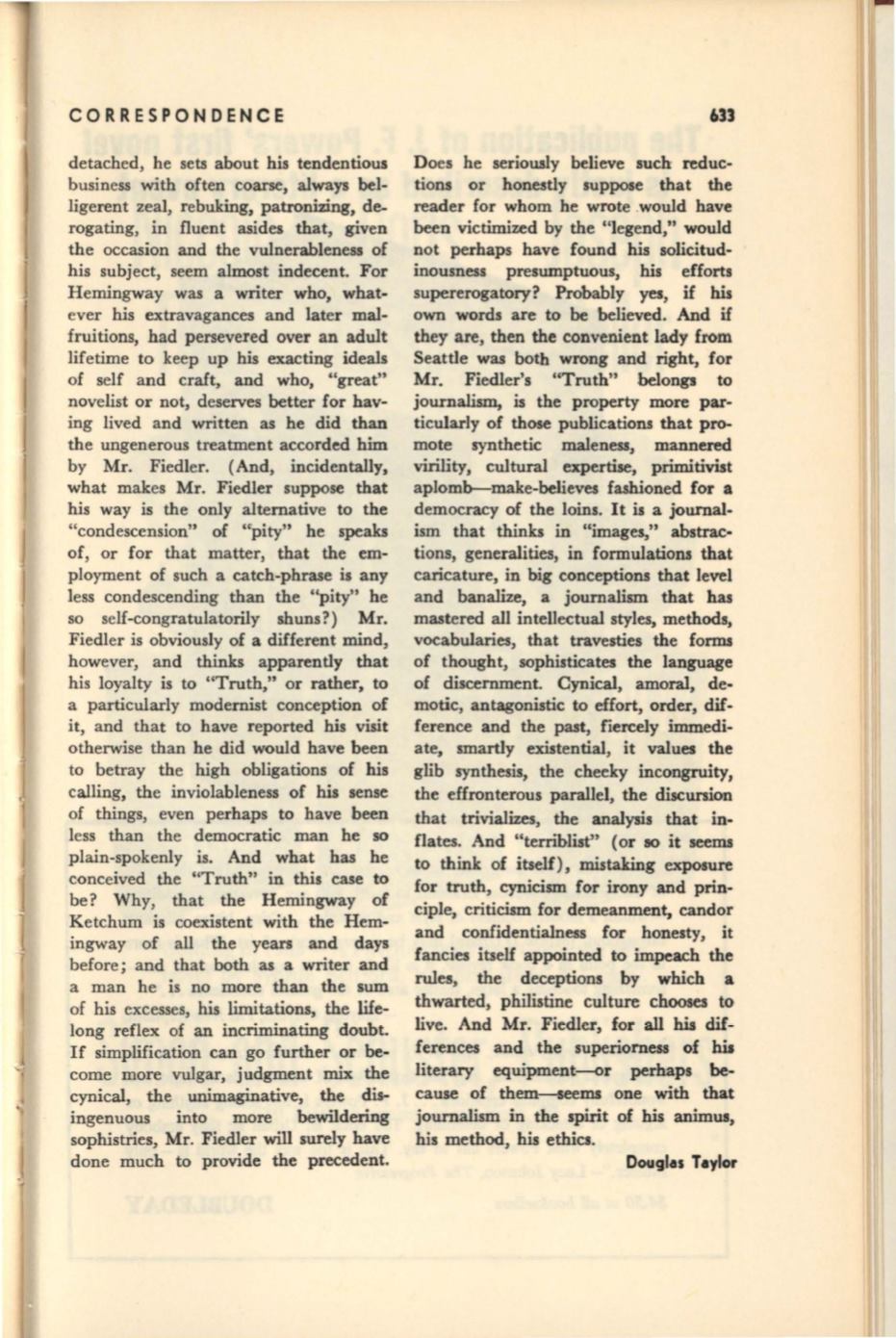
CORRESPONDENCE
detached, he sets about his tendentious
business with often coarse, always bel–
ligerent zeal, rebuking, patronizing, de–
rogating, in fluent asides that, given
the occasion and the vulnerableness of
his subject, seem almost indecent. For
Hemingway was a writer who, what–
ever his extravagances and later mal–
fruitions, had persevered over an adult
lifetime to keep up his exacting ideals
of self and craft, and who, "great"
novelist or not, deserves better for hav–
ing lived and written as he did than
the ungenerous treatment accorded him
by Mr. Fiedler. (And, incidentally,
what makes Mr. Fiedler suppose that
his way is the only alternative to the
"condescension" of "pity" he speaks
of, or for that matter, that the em–
ployment of such a catch-phrase is any
less condescending than the "pity" he
so self-congratulatorily shuns?) Mr.
Fiedler is obviously of a different mind,
however, and thinks apparently that
his loyalty is to "Truth," or rather, to
a particularly modernist conception of
it, and that to have reported his visit
otherwise than he did would have been
to betray the high obligations of his
calling, the inviolableness of his sense
of things, even perhaps to have been
less than the democratic man he so
plain-spokenly is. And what has he
conceived the "Truth" in this case to
be? Why, that the Hemingway of
Ketchum is coexistent with the Hem–
ingway of all the years and days
before ; and that both as a writer and
a man he is no more than the sum
of his excesses, his limitations, the life–
long reflex of an incriminating doubt.
If
simplification can go further or be–
come more vulgar, judgment mix the
cynical, the unimaginative, the dis–
ingenuous into more bewildering
sophistries, Mr. Fiedler will surely have
done much to provide the precedent.
633
Does he seriously believe such reduc–
tions or honestly suppose that the
reader for whom he wrote .would have
been victimized by the "legend," would
not perhaps have found his solicitud–
inousness presumptuous, his efforts
supererogatory? Probably yes, if his
own words are to be believed. And if
they are, then the convenient lady from
Seattle was both wrong and right, for
Mr. Fiedler's "Truth" belongs to
journalism, is the property more par–
ticularly of those publications that pro–
mote synthetic maleness, mannered
virility, cultural expertise, primitivist
aplomb--make-believes fashioned for a
democracy of the loins. It is a journal–
ism that thinks in "images," abstrac–
tions, generalities, in formulations that
caricature, in big conceptions that level
and banalize, a journalism that has
mastered all intellectual styles, methods,
vocabularies, that travesties the forms
of thought, sophisticates the language
of discernment. Cynical, amoral, de–
motic, antagonistic to effort, order, dif–
ference and the past, fiercely immedi–
ate, smartly existential,
it
values the
glib synthesis, the cheeky incongruity,
the effronterous parallel, the discursion
that trivializes, the analysis that in–
flates. And "terriblist" (or so it seems
to think of itself), mistaking exposure
for truth, cynicism for irony and prin–
ciple, criticism for demeanment, candor
and confidentialness for honesty, it
fancies itself appointed to impeach the
rules, the deceptions by which a
thwarted, philistine culture chooses to
live. And Mr. Fiedler, for all his dif–
ferences and the superiorness of hi,
literary equipment-<lr perhaps
be–
cause of them--seems one with that
journalism in the spirit of his animus,
his method, his ethics.
Douglas Taylor


